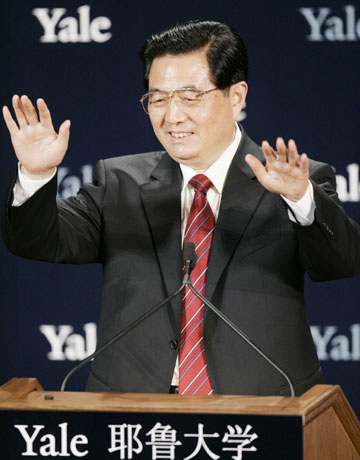President Hu Jintao offered reassurances on Friday that China seeks a
peaceful development to economic prosperity, a theme he has articulated since
the first stop of his four-day US trip.

Chinese President Hu
Jintao gestures to the audience at the beginning of his address during his
visit to Yale University in New Haven, Connecticut, April 21, 2006.
[Reuters] |
Hu said China commits itself
firmly to peaceful development and holds high the banner of peace, development
and co-operation.
"China seeks to accelerate its development by upholding world peace and in
turn enhance world peace through its development," he said during a speech at
the Sprague Hall of Yale University in Connecticut.
Hu was addressing an audience of 600 people, including Yale University top
officials, members of the board of trustees, professors and students, as well as
representatives from local Chinese businesses.
"China is inclusive and is eager to draw on the strength of other
civilizations to pursue peace and development, and play its part in building a
harmonious world of peace and prosperity," he said.
His historic trip to the elite university, where US President George W. Bush
once studied, came following a summit on Thursday with Bush, which Hu described
as "fruitful."

President Hu Jintao (2L) shows
Yale University students some of his gifts of Chinese books to the
university as Yale University President Richard C. Levin (left) watches in
New Haven, Connecticut, on Friday.
[Reuters] |
During his one-hour speech, which was broadcast live back in China, Hu
elaborated on China's development strategy and its future in a bid to promote a
better understanding of China.
Hu stressed that China, despite its fast economic growth over the past two
decades, remains the world's largest developing country and still faces daunting
challenges in its endeavour to develop.
"It requires sustained and unremitting efforts to transform our country and
make life better for our people," he said.
Although China has achieved an economic miracle in the past 28 years, "any
number divided by 1.3 billion will become very small," Hu said, noting that
China's per capita ranking is still behind 100th place in the world.
"We have encountered many difficulties. We hope to see a peaceful
international environment. China's development will not compromise the interest
of other countries."
The president said China has adopted a scientific concept of development,
focusing on sustainable development by boosting production, improving people's
life and protecting the environment.
Turning to China's history, Hu said the decision to pursue peaceful
development is deeply rooted in its historical and cultural traditions, which
give prominence to unity, mutual assistance and good neighbourliness.
Hu highlighted the importance of closer Sino-US relations.
"The different historical backgrounds and national conditions between China
and the United States enable us to learn from each other and draw on each
other's strength," he said, winning applause from the audience.
Citing the anti-terrorism fight, environmental protection and combating
transnational crimes as examples, Hu said the common interests between the two
powers are increasing and the areas of bilateral co-operation are also widening.
Hu said he and President Bush share the view that the two sides should
approach bilateral ties from the strategic and long-term perspective.
As long as both sides focus on the overall interest of China-US relations,
respect and show understanding to each other, bilateral ties will move ahead in
a healthy and steady manner, the president said.
"What impressed me is his very direct answers to very difficult questions,"
said Steven M. Chapman, group vice-president of Emerging Markets &
Businesses for Cummins Inc, after a question-and-answer session following Hu's
speech.
William Reilly, head of environment for former US President George Bush,
said: "I am impressed (with his speech). He is very open."
Before the speech, Hu met with Yale President Richard C. Levin, who has
visited China six times.
At a private reception in Levin's office, Hu presented Yale with a donation
of more than 1,300 books from China.
In return, Yale presented a portrait of Yung Wing (1828-1912), the first
Chinese student to study in the United States, who graduated from Yale in 1854.
The school, founded in 1701, has more than 80 academic collaborations with
Chinese institutions and offers 26 study sites in China.
During the speech, Hu announced that China has decided to invite 100 Yale
faculty members and students to visit China this summer.
Today, 300 of Yale's roughly 11,000 students are Chinese, the largest
contingent from any foreign country.
There are also more than 300 visiting scholars from China at the university.